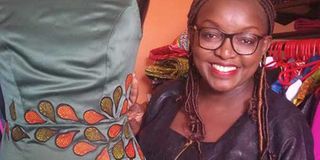The mistake you can make is limit yourself...

Kawira mirero is the founder of Mambo Pambo designs. PHOTO | NATION
What you need to know:
- What we wear needs to reflect a sense of connectedness to our identity, which, in my estimation, is very important. There is a difference between us (Kenyans) and other people and what we wear needs to be deliberate and thoughtful.
- What we wear needs to reflect a sense of connectedness to our identity, which, in my estimation, is very important. There is a difference between us (Kenyans) and other people and what we wear needs to be deliberate and thoughtful.
- Read as much as possible about business education – design could be fun, but at the end of the day, it is a business. Keep meticulous records, and finally, understand that some days will be tough but they go away eventually.
She has worked for organisations such as Nation Media Group, Strathmore University and Davis & Shirtliff Group. In West Africa, she served tech companies as a marketing consultant responsible for government accounts, including the Nigeria Federal Road Safety Commission. She continues to serve a number of corporate entities through Redbrick Marketing Consultancy.
The fashion industry in Kenya is bombarded with so many external influences, both from the West and other parts of Africa. Why do you think that having a ‘Kenyanness’ to our clothes really matters?
What makes us Kenyan? I think that it is important for the clothes that we wear to reflect the people that we are – vibrant, energetic, happy and hardworking.
What we wear needs to reflect a sense of connectedness to our identity, which, in my estimation, is very important. There is a difference between us (Kenyans) and other people and what we wear needs to be deliberate and thoughtful.
Unlike you, most young people do not get to know what they are good at until they are older and have finished studying courses they are not enthusiastic about.
What is your advice on redeeming time?
I was very fortunate to have had supportive parents who nurtured my creative passions from an early age. That said, there is nothing wrong with not knowing your passion very early in life. And absolutely no knowledge goes to waste. Even if you are in school and you think that you do not need your course, just give it your best and see where it goes.
Also actively look for an opportunity that will use up the skills that you have and begin to train yourself because this will give you a lot more exposure and an understanding of where you want to go.
In an interview you say that all the jobs that you held from 2000-2014 had a design component (your passion) in them. In a world where you have to do the job that you find, what was your secret to getting your fit?
First of all, I would like to say that positivity feeds on itself. So for me, it was attitude that convinced me that there was something out there that fit my passion and skill set. It was not always smooth and it was not about the money at the beginning.
With my positive outlook and a can-do attitude, I knew that with whatever job I got into, the dots would eventually connect. So, even when you think that the job you are doing does not minister to your passion, look deeper because there are other things that you get in there – life skills, tolerance, patience and the ability to serve, all of which are very essential for wherever life takes you.
And young people should be willing to start from the bottom and work their way up.
Imagine you are just beginning Mambo Pambo, advice yourself about the best practices for a new business.
Read as much as possible about business education – design could be fun, but at the end of the day, it is a business. Keep meticulous records, and finally, understand that some days will be tough but they go away eventually.
What influence(s) has living in different countries and cultures had on the kind of designer that you are now?
Moving around made me realise that human beings are in essence the same and that my understanding of creativity as being able to have a universal appeal was not misguided. Also, the exposure gave me a lot more confidence and made me a better person who is open to feedback and influences from diverse people.
What advice would you give to a young person trying to get into fashion design as a career?
Get the best quality education in fashion and understand that creativity is a muscle which gets better when you use it. Success is not something that happens overnight, so patience is important. Finally, fashion is capital intensive, so you must be ready to prove your worth to attract both clients and investors.
What was your greatest fear when you started your business?
For a long time, I had the imposter syndrome, I thought I could not design. I hardly believed in myself at the beginning, but with time and getting good feedback from happy clients, I started to build self-confidence.
Apart from fashion, you are a marketing consultant. Do you consider having more than one career a strength or a weakness?
I think that you can do more than one thing, the secret is discovering which of your skills is more developed or which brings in money and so on, and then working towards harmonising them. There is no harm is having more than one skill because they can always feed off one another.
How do you draw in new talent in your organisation?
I try very hard to mentor students who want to get into this business and I also give them an opportunity if they prove that they can work.





